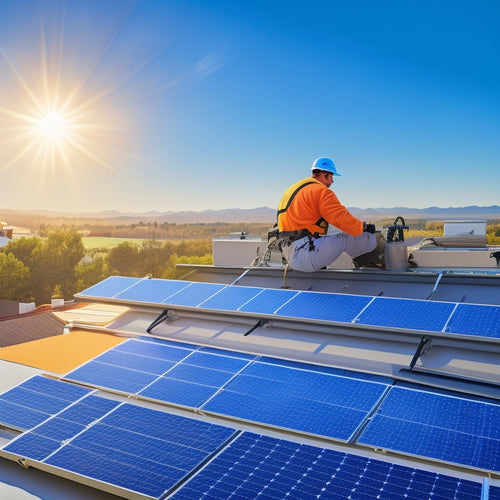
Solar Panel Maintenance for Maximum Efficiency
Share
You can greatly enhance your solar panels' energy output by adopting a regular maintenance routine that tackles common issues like dirt buildup, mechanical wear, and performance degradation. Clean your panels every six months, or more frequently in high-pollution areas, using soft-bristled brushes and gentle cleaning solutions. Inspect your system regularly for signs of damage, wear, or pest infestations, and take action to address any issues you find. Additionally, monitor your system's performance and output, and schedule professional inspections as needed. By following these steps, you'll be well on your way to maximizing your solar panels' efficiency - and there's even more you can do to get the most out of your system.
Key Takeaways
- Inspect solar panels every 6 months for dirt and debris, and clean more frequently in high pollution or dusty areas for optimal energy production.
- Conduct regular visual inspections to identify and address damage, wear, and loose connections that can reduce efficiency.
- Ensure panels remain unobstructed by trimming or removing trees, buildings, or vents that cast shadows, and clear debris, dirt, or snow regularly.
- Monitor performance and output by tracking energy production, voltage, current, and temperature to identify potential issues and maintain maximum efficiency.
- Schedule professional inspections based on system age, size, and environment to identify issues and receive maintenance recommendations for optimal performance.
Cleaning Solar Panels Effectively
Every six months or so, you should inspect your solar panels for dirt, grime, and other debris that can reduce their energy output.
Regular cleaning is essential to guarantee your solar panels operate at maximum efficiency. A good cleaning frequency is every 6 months, but if you live in an area with high levels of pollution or dust, you may need to clean them more frequently.
When it comes to cleaning techniques, avoid using harsh chemicals or abrasive materials that can scratch the panels.
Instead, use a soft-bristled brush or a cleaning solution specifically designed for solar panels. You can also use a garden hose to rinse off any loose debris.
For more stubborn grime, mix baking soda and water to create a paste, and apply it to the affected area. Let it sit for about 30 minutes before rinsing off with water.
Inspecting for Damage and Wear
In addition to keeping your solar panels clean, you should also regularly inspect them for signs of damage or wear that can impact their performance. Visual inspections can help you identify common issues before they become major problems.
Start by looking for physical damage such as cracks, broken glass, or loose connections. Check for signs of wear on the panels' frames, mounts, and tracking systems. Confirm all screws, bolts, and nuts are securely tightened.
Also, inspect the electrical components, including inverters, connectors, and wiring. Check for signs of overheating, corrosion, or water damage. Look for any signs of pest or rodent infestation, as they can chew through wires and cause damage.
Take note of any unusual noises, odors, or vibrations, as they can indicate underlying issues. By regularly inspecting your solar panels, you can catch potential problems early and take corrective action to guarantee your system operates at maximum efficiency.
Avoiding Shading and Obstructions
By the time your solar panels are installed, you've likely taken care to confirm they're positioned to maximize energy production. However, even with ideal placement, shading and obstructions can still occur, greatly reducing your system's efficiency.
It's vital to identify and address these issues to make certain you're getting the most out of your solar panels. Conduct a thorough obstruction analysis to detect any potential blockages, such as trees, buildings, or vents. Trim or remove any obstacles that could cast a shadow on your panels, and consider implementing shading solutions like skirting or baffles to minimize the impact of unavoidable obstructions.
Regularly inspect your solar panels for debris, dirt, or snow that can also obstruct energy production. Keep your panels clean and clear of obstructions to guarantee maximum energy output.
Monitoring Performance and Output
From the moment your solar panel system is up and running, it's essential that you keep a close eye on its performance and output to guarantee it's operating at its best. Monitoring your system's performance metrics is vital for output optimization. You'll want to track key indicators such as energy production, voltage, current, and temperature.
| Metric | Target Range |
|---|---|
| Energy Production (kWh) | 90-100% of rated capacity |
| Voltage (V) | ±10% of rated voltage |
| Current (A) | ±10% of rated current |
| Temperature (°C) | 25-40°C |
| Inverter Efficiency (%) | 95-98% |
Scheduling Professional Inspections
You've got a handle on monitoring your solar panel system's performance and output, guaranteeing it's running at its best. However, even with regular monitoring, it's vital to schedule professional inspections to catch any potential issues before they affect your system's efficiency.
The frequency of these inspections depends on various factors, including the system's age, size, and environmental conditions.
As a general rule, it's recommended to schedule seasonal checkups to address any seasonal-specific issues. For instance, after winter, an inspection can help identify and clean off debris that may have accumulated on the panels.
In regions with high temperatures, summer inspections can help detect heat-related issues.
The inspection frequency may vary depending on your system's unique needs. For example, if you live in an area with high winds or extreme weather conditions, you may need to schedule more frequent inspections.
A professional inspector can identify potential problems, such as loose connections or damaged components, and provide recommendations for repairs or maintenance.
Frequently Asked Questions
Can I Use a Pressure Washer to Clean My Solar Panels?
Did you know 98% of solar panels are never cleaned, losing up to 25% efficiency? You shouldn't use a pressure washer for solar panel cleaning, as it can damage the panels; instead, opt for a gentle, soap-free cleaning method to guarantee safe and peak energy production.
How Often Should I Inspect My Solar Panel Mounting System?
You should inspect your solar panel mounting system quarterly, confirming mounting stability by checking for loose bolts, rust, and signs of wear; use an inspection checklist to guarantee a thorough review of the system's integrity.
Will Solar Panels Still Work During a Power Outage?
When the lights go out, you're left wondering, will your solar panels still shine? The answer is, sadly, no - during a power outage, your solar panel performance takes a hit, and you won't reap the benefits, unless you have a battery backup system in place.
Can I Install Solar Panels on a Metal Roof?
You can install solar panels on a metal roof, leveraging metal roof advantages like increased durability and water resistance. However, consider installation considerations like specialized clips, sealants, and roof penetrations to guarantee a secure, watertight fit.
Are Solar Panels Covered Under My Homeowner's Insurance?
You're probably wondering if your shiny new solar panels are protected from disaster - the answer is, it depends. Check your homeowner's insurance policy to see if it covers solar panels, and what the policy limits are, to guarantee you're fully protected.
Related Posts
-

Top Online Stores for Solar Car Accessories
When searching online for solar car accessories, you'll find top retailers like Amazon, REI Co-op, and Best Buy offer...
-

Why Cities Need Smart Charging Infrastructure Now
You're about to experience a tidal wave of electric vehicles hitting your city's streets, and it's essential you're p...
-

3 Essential Steps for Solar Electricity Installation
To guarantee a successful solar electricity installation, you'll need to follow three essential steps. First, assess ...


